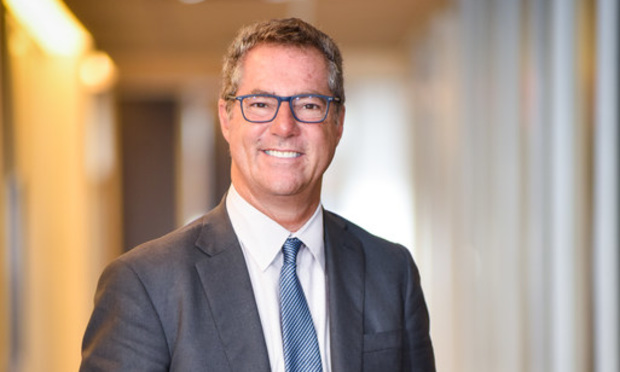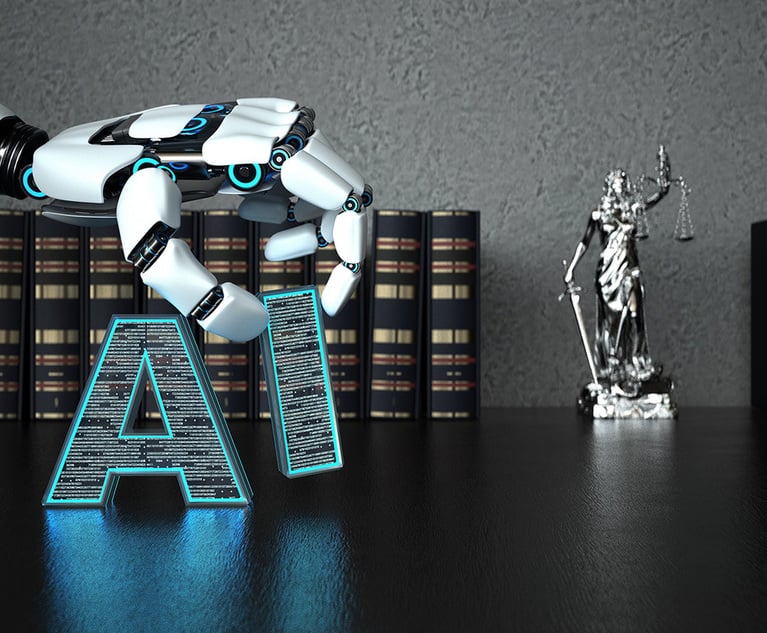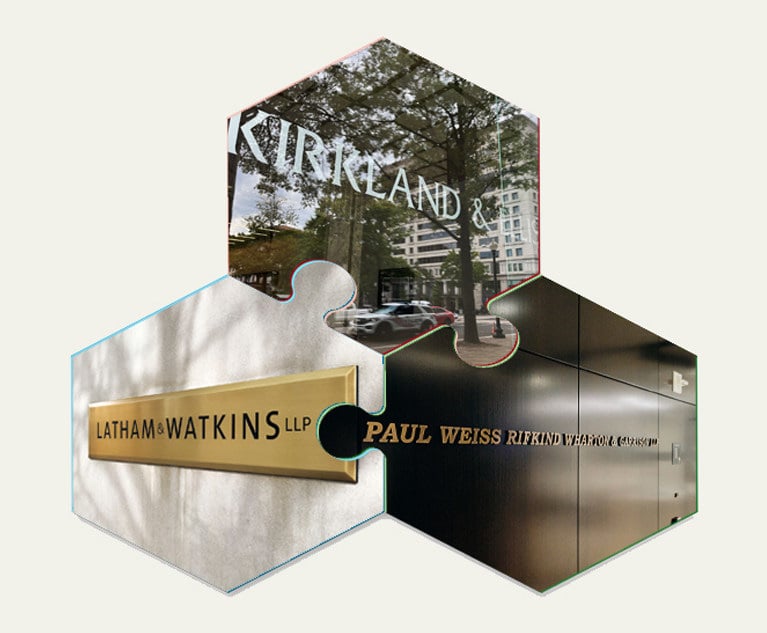Brad Karp: The Legal Community Must Protect Workers and Small Businesses From Coronavirus Fallout
In this time of fear and isolation, it is imperative that we in the legal profession not lose sight of our professional obligation to help others in need.
March 25, 2020 at 11:05 AM
7 minute read
The original version of this story was published on The American Lawyer
 Brad Karp. Photo: David Handschuh/ALM
Brad Karp. Photo: David Handschuh/ALM
As the leader of a law firm employing more than 1,000 attorneys, and as someone who has helped lead national pro bono initiatives to reunite separated immigrant families, promote gun control, safeguard LGBTQ rights, protect reproductive freedom and secure voter enfranchisement, I am daunted by the carnage our nation is about to confront involving the tens of millions of American workers devastated medically, emotionally and economically by the fallout from the COVID-19 pandemic. While we fear that the loss of life resulting from this pandemic may be catastrophic, we know for certain that our most vulnerable citizens will be ravaged economically as a result.
In this time of fear and isolation, it is imperative that we in the legal profession not lose sight of our professional obligation to help others in need. While this pandemic will continue to impact all Americans, its devastating economic consequences will not be equally shared. The impacts will be felt most acutely by those in our society who are least able to endure loss. To slow the spread of the virus, states and localities across the country are closing schools, restaurants, bars, retail shops, museums, theaters, libraries, parks, stadiums and other public venues and directing people to stay home—actions that will be catastrophic both to the tens of millions of hourly workers in our country who live paycheck to paycheck, and to small business owners dealing with lost revenue and mounting costs.
The need for help is staggering. The numbers here speak for themselves. More than 50 million Americans earn "low wages," defined as median hourly earnings of $10.22 or less. More than half of all U.S. adults live paycheck to paycheck and do not have an emergency fund covering three months of expenses. And most American businesses do not extend severance pay to employees. Add to these sobering realities the fact that these low-wage employees work predominantly in industries that are among the most catastrophically hurt by the pandemic, including 16 million Americans in the leisure and hospitality industries, 5 million food service workers, and 4.5 million retail clerks. The American Hotel & Lodging Association estimates that 1 million hotel jobs, or nearly one half of the total jobs in the industry nationwide, have already been or will be eliminated in the next few weeks. Every day, the headlines become increasingly dire.
In recent days, our federal, state and local governments, along with the nonprofit sector, have responded to this crisis by making emergency resources available to those in need of assistance. In reality, however, significant barriers prevent those most desperately in need from accessing these critical resources. Even in ordinary times, most of the affected individuals would find it daunting to identify the programs for which they are eligible, let alone understand the intricacies and sort out the complex claims and application processes. Many programs have overlapping subject matter and confusing eligibility requirements. Many programs are funded at one level and administered at another, adding further complexity. Agency phone lines and websites are overwhelmed and crashing under the avalanche of inquiries. Community services organizations, already underfunded and stretched thin in helping the most vulnerable, are under tremendous strain to keep up with the daily rollout of new relief programs.
Lawyers can play a vital role in breaking down these barriers. As the crisis deepened, I asked my colleagues at Paul, Weiss, Rifkind, Wharton & Garrison for volunteers willing to collect, digest, organize and synthesize the flood of information about emergency relief available to the tens of millions of Americans most impacted by the pandemic and to build an infrastructure to make this information accessible to and actionable by the most vulnerable. My colleagues answered the call in unprecedented numbers. More than 400 attorneys volunteered in the first two hours; since then, many have been working around the clock, pro bono, to identify and analyze the hundreds of potentially applicable federal, state, local and nonprofit relief programs. They have prepared indices of available relief, summarized the key programs and eligibility requirements, and provided a roadmap for how to apply for and secure relief.
On March 24, our firm's online Coronavirus Relief Center went live. The relief center is an easily navigable repository of the most up-to-date information on hundreds of local, state, federal and nonprofit relief programs available to the millions of Americans economically impacted by the coronavirus pandemic. The programs provide a broad range of emergency relief: opportunities for out-of-work employees to receive enhanced unemployment benefits; provisions enabling certain employees to take sick leave, family leave and avail themselves of other forms of relief for missing work; opportunities for qualifying families to receive emergency cash assistance; opportunities for small businesses to secure grants to cover payroll costs; opportunities for small businesses to apply for zero-interest loans to mitigate lost profits; loan programs available to qualifying small businesses to fund working capital costs; plus many additional forms of relief.
The website demystifies what otherwise would be a daunting process. It offers a menu of jurisdictions to choose from. After selecting a jurisdiction—their state of residence, for example—users are offered a menu of available programs for individuals and small businesses in that jurisdiction. They can click on any relief program to view a short summary of the program, in simple terms, including eligibility requirements and the types of relief available, in a format that is easily understood by nonlawyers. They may also view contact information for those responsible for administering the program's relief and links to additional information about the program and application forms, if available.
Of course, my law firm is not alone in caring for those whose lives have been hardest hit by the pandemic. Bar associations, public interest lawyers, legal aid organizations, private practitioners and corporate law departments are mobilizing resources to bring relief to the vulnerable and powerless. As news of our project has spread in the legal community, we have been contacted by dozens of law firms and in-house legal departments eager to make a difference. I have been deeply moved by this outpouring of unity and this commitment to the public good. Our firm is committed to contributing whatever institutional and human resources we have at our disposal to help those in need.
But the crisis we are now confronting is too daunting, too sprawling and too complex to be addressed by a single law firm or even a group of law firms—no matter how well-intentioned and no matter how well-resourced. We intend to form partnerships across the bar, our clients and the public interest community to support these efforts to help those desperately in need. And while our online Coronavirus Resource Center is focused on the needs of Americans, we will be working internationally with organizations like The Cyrus R. Vance Center for International Justice to enable law firms outside of the United States to provide pro bono legal support for those affected in their countries.
To deal with the economic dislocation of tens of millions of Americans and hundreds of millions of individuals around the globe, the private bar, writ large and in historic numbers, will need to join forces with leading public interest organizations to confront the challenges we now face as a society. This is a call to action across our legal community. Our work is only beginning.
As many of us spend our days shuttered at home, our routines, our work and our lives interrupted by this invisible virus, it is critical that those of us with the resources and skills to help not lose sight of those among us who are most vulnerable, and who will not have jobs to return to after this pandemic eventually subsides. What all of us do right now will make all the difference to these individuals—and will ensure that we, as lawyers, are part of the solution.
Brad S. Karp has been the chairman of Paul, Weiss, Rifkind, Wharton & Garrison since 2008.
This content has been archived. It is available through our partners, LexisNexis® and Bloomberg Law.
To view this content, please continue to their sites.
Not a Lexis Subscriber?
Subscribe Now
Not a Bloomberg Law Subscriber?
Subscribe Now
NOT FOR REPRINT
© 2025 ALM Global, LLC, All Rights Reserved. Request academic re-use from www.copyright.com. All other uses, submit a request to [email protected]. For more information visit Asset & Logo Licensing.
You Might Like
View All
DeepSeek’s AI Power Move: Will Lawyers Be the Next to Adapt or Perish?
6 minute read
Now That the Trump Era Has Begun, Change Is Coming. For Big Law, Change Is Already Here
6 minute readLaw Firms Mentioned
Trending Stories
- 1'Careless Execution' of Presidential Pardons Freed Convicted Sex Trafficker, US Judge Laments
- 2Newsmakers: Littler Elevates Dallas Attorney to Shareholder
- 3South Florida Real Estate Lawyers See More Deals Flow, But Concerns Linger
- 4General Counsel Accused of Destroying Evidence
- 52,000 Docket Entries: Complex South Florida Dispute Sets Precedent
Who Got The Work
J. Brugh Lower of Gibbons has entered an appearance for industrial equipment supplier Devco Corporation in a pending trademark infringement lawsuit. The suit, accusing the defendant of selling knock-off Graco products, was filed Dec. 18 in New Jersey District Court by Rivkin Radler on behalf of Graco Inc. and Graco Minnesota. The case, assigned to U.S. District Judge Zahid N. Quraishi, is 3:24-cv-11294, Graco Inc. et al v. Devco Corporation.
Who Got The Work
Rebecca Maller-Stein and Kent A. Yalowitz of Arnold & Porter Kaye Scholer have entered their appearances for Hanaco Venture Capital and its executives, Lior Prosor and David Frankel, in a pending securities lawsuit. The action, filed on Dec. 24 in New York Southern District Court by Zell, Aron & Co. on behalf of Goldeneye Advisors, accuses the defendants of negligently and fraudulently managing the plaintiff's $1 million investment. The case, assigned to U.S. District Judge Vernon S. Broderick, is 1:24-cv-09918, Goldeneye Advisors, LLC v. Hanaco Venture Capital, Ltd. et al.
Who Got The Work
Attorneys from A&O Shearman has stepped in as defense counsel for Toronto-Dominion Bank and other defendants in a pending securities class action. The suit, filed Dec. 11 in New York Southern District Court by Bleichmar Fonti & Auld, accuses the defendants of concealing the bank's 'pervasive' deficiencies in regards to its compliance with the Bank Secrecy Act and the quality of its anti-money laundering controls. The case, assigned to U.S. District Judge Arun Subramanian, is 1:24-cv-09445, Gonzalez v. The Toronto-Dominion Bank et al.
Who Got The Work
Crown Castle International, a Pennsylvania company providing shared communications infrastructure, has turned to Luke D. Wolf of Gordon Rees Scully Mansukhani to fend off a pending breach-of-contract lawsuit. The court action, filed Nov. 25 in Michigan Eastern District Court by Hooper Hathaway PC on behalf of The Town Residences LLC, accuses Crown Castle of failing to transfer approximately $30,000 in utility payments from T-Mobile in breach of a roof-top lease and assignment agreement. The case, assigned to U.S. District Judge Susan K. Declercq, is 2:24-cv-13131, The Town Residences LLC v. T-Mobile US, Inc. et al.
Who Got The Work
Wilfred P. Coronato and Daniel M. Schwartz of McCarter & English have stepped in as defense counsel to Electrolux Home Products Inc. in a pending product liability lawsuit. The court action, filed Nov. 26 in New York Eastern District Court by Poulos Lopiccolo PC and Nagel Rice LLP on behalf of David Stern, alleges that the defendant's refrigerators’ drawers and shelving repeatedly break and fall apart within months after purchase. The case, assigned to U.S. District Judge Joan M. Azrack, is 2:24-cv-08204, Stern v. Electrolux Home Products, Inc.
Featured Firms
Law Offices of Gary Martin Hays & Associates, P.C.
(470) 294-1674
Law Offices of Mark E. Salomone
(857) 444-6468
Smith & Hassler
(713) 739-1250










